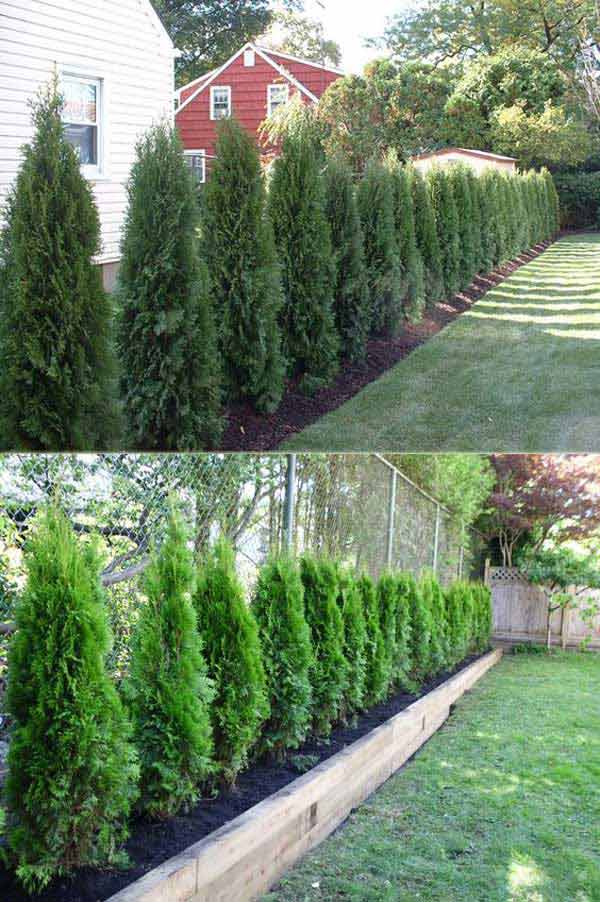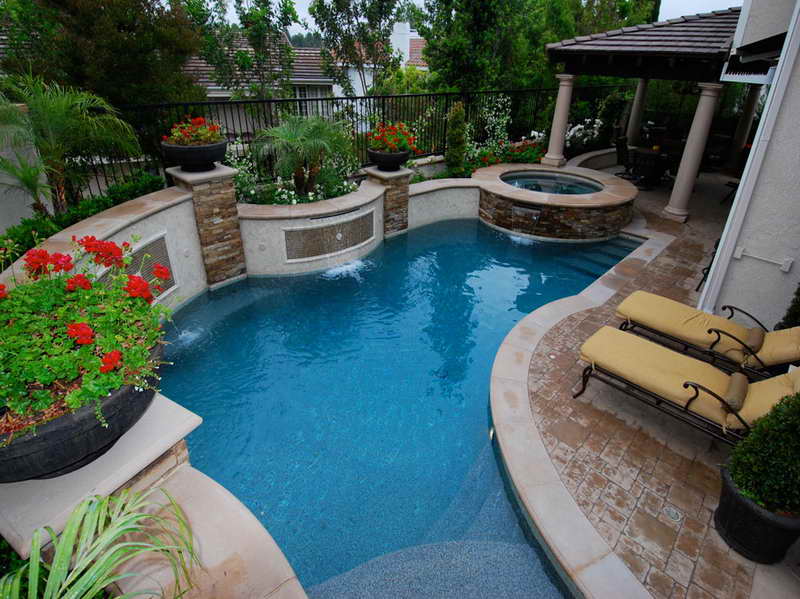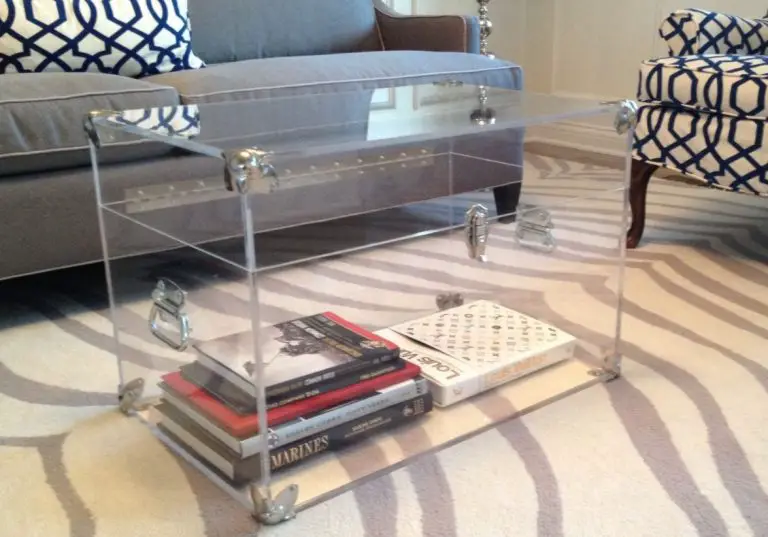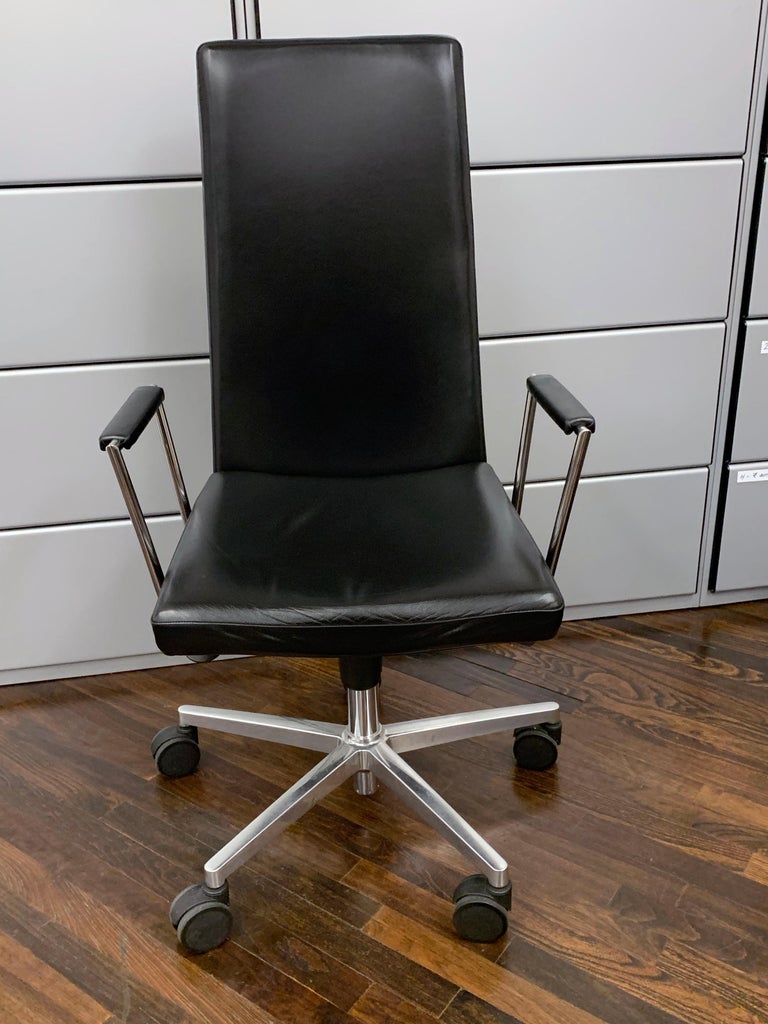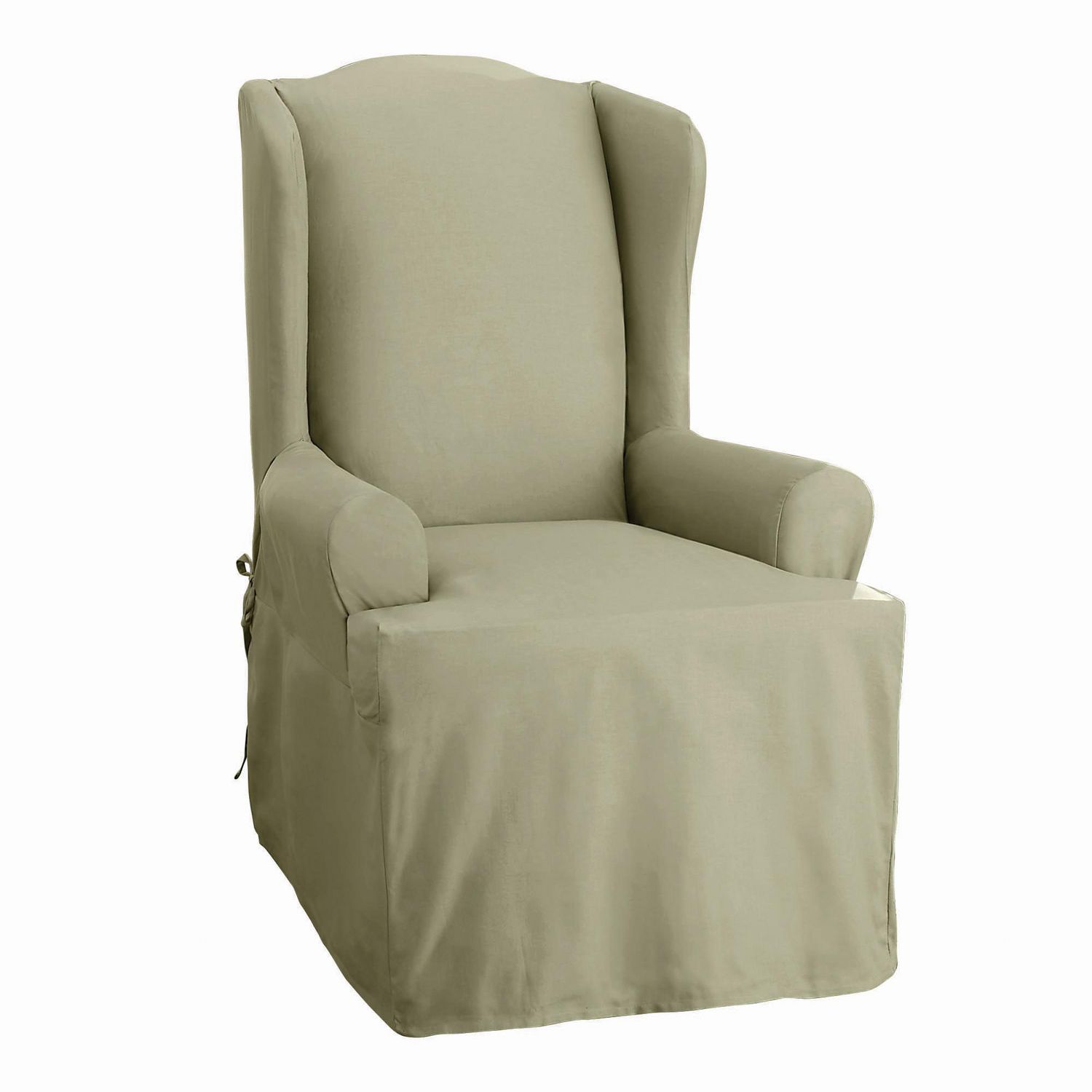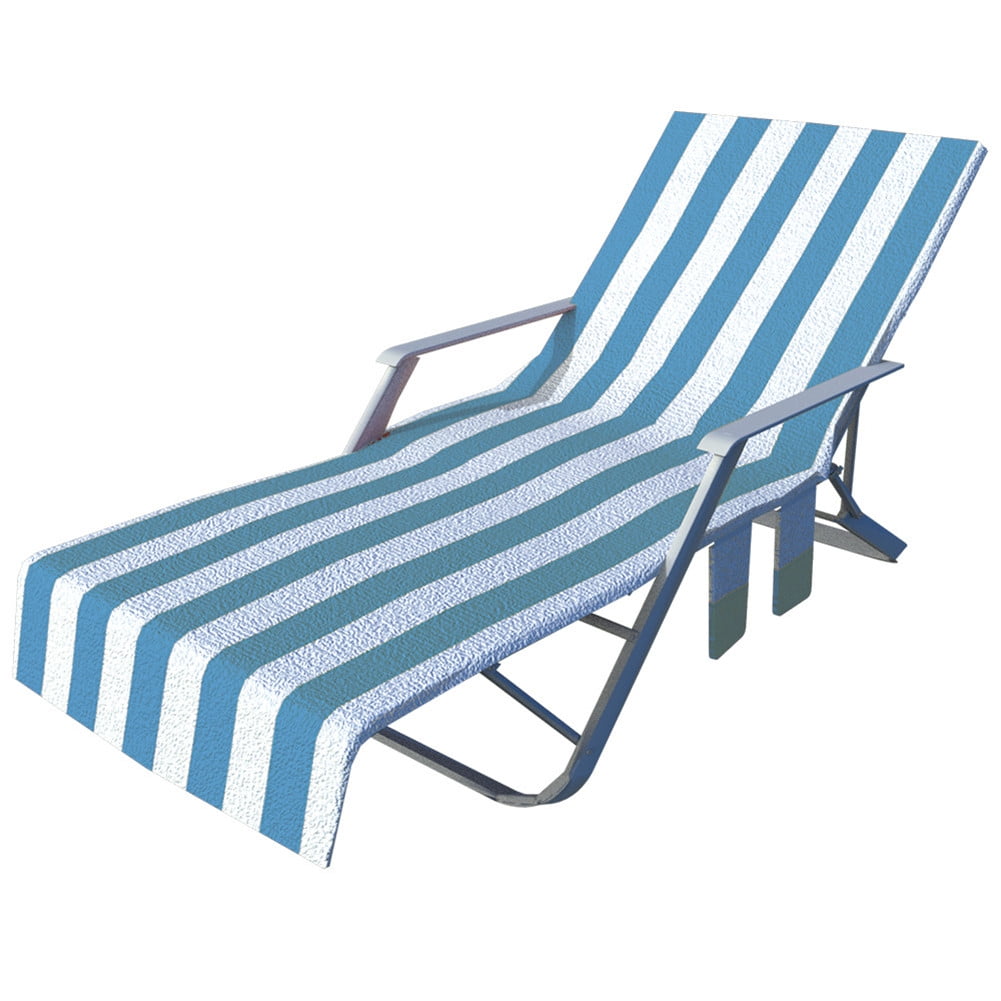Evergreens are good for privacy screens because they stay green (and provide privacy) all year long. The height and spread is 1.5m, which makes this a good plant to frame a seating area and provide some privacy at the same time.
Plants That Provide Privacy, This is one of the most popular and best outdoor evergreen screening plants for backyard privacy from neighbours. Evergreens with large foliage or evergreen conifers with branches that extend to the ground are the most useful for privacy.

Benefits of planting privacy bushes; They offer privacy while providing a beautiful outlook to the landscape. They all use plants to add the layers of privacy i mentioned earlier. A good choice is the viburnum tinus, a small leaf evergreen that grows to about 3.5 metres.
The privet is the quintessential (or at least the most familiar) privacy hedge plant.
Able to provide you with the privacy you�re looking for, it grows up to five metres tall. At maturity, plants grow to heights of six feet or more. You can plant them at the pergola posts, arch or arbor and have a fascinating backyard retreat. Let’s dive into some options for both a commercial landscape design privacy border, as well as some residential landscape privacy plants. A lot of us love bamboo, but it can be a lot of maintenance if you plant it in the ground. Evergreens are good for privacy screens because they stay green (and provide privacy) all year long.
 Source: gardenmandy.com
Source: gardenmandy.com
The height and spread is 1.5m, which makes this a good plant to frame a seating area and provide some privacy at the same time. White flowers appear in spring and in early summer, which transforms the greenery into a spectacular show. To create a dense privacy screen, evergreen trees should be spaced so that their branches just touch one.
 Source: diyselfy.blogspot.com
Source: diyselfy.blogspot.com
A very dense hedge of hawthorn or something similar will give some privacy all year round and provide leaves, flowers and berries. Glossy green shrubs like these grow in a tight and dense form, giving you complete privacy, with plants. Here are the best plants to cover a fence.these will help you provide a natural privacy screen and a beautiful.
 Source: hortzone.com
Source: hortzone.com
This shrub may be the most popular plant for hedge designs. Plant canadian hemlocks close together in rows to create dense hedges that will provide privacy and shield you from noise or wind. Let’s dive into some options for both a commercial landscape design privacy border, as well as some residential landscape privacy plants. Evergreens are good for privacy screens.
 Source: houzz.com
Source: houzz.com
See our plants for privacy, all of which typically reach their mature size within a few seasons. Below you will find 10 options to choose from and don’t worry, we understand not everyone has a green thumb. Plant canadian hemlocks close together in rows to create dense hedges that will provide privacy and shield you from noise or wind. The.
 Source: thegardenglove.com
Source: thegardenglove.com
Benefits of planting privacy bushes; While ligustrum vulgare was once the most common type of privet planted, it has lost popularity to some of the more ornamental varieties, such as japanese privet ( l. Thuja is a large evergreen that is commonly used for privacy hedges because it grows fast and is easy to maintain. They offer privacy while providing.
 Source: pinterest.com
Source: pinterest.com
Let’s dive into some options for both a commercial landscape design privacy border, as well as some residential landscape privacy plants. Cypress also grows very tall and narrow, meaning it can be planted close together to as a privacy screen. Even though it is deciduous, the persistent leaves still provide some peace through the winter months. Plus, these flowering plants.
 Source: woohome.com
Source: woohome.com
Plant canadian hemlocks close together in rows to create dense hedges that will provide privacy and shield you from noise or wind. White flowers appear in spring and in early summer, which transforms the greenery into a spectacular show. Leyland cypress trees should be planted in a large landscape where it can get plenty of sun. Foliage design systems of.

Some vining plants that grow fast are ivy, clematis or hops. These plants will quickly cover a fence and provide privacy. That makes it harder to get food off of them, but beach where the leaves cling all winter is pretty close and the young leaves in the spring are edible and taste nice. When grouped with smaller container plants.
 Source: blessmyweeds.com
Source: blessmyweeds.com
A good choice is the viburnum tinus, a small leaf evergreen that grows to about 3.5 metres. Evergreens with large foliage or evergreen conifers with branches that extend to the ground are the most useful for privacy. These plants will quickly cover a fence and provide privacy. It grows quickly, prunes nicely, and has flowers that lead to fruit clusters.
 Source: thegardenglove.com
Source: thegardenglove.com
Here are the best plants to cover a fence.these will help you provide a natural privacy screen and a beautiful view as well. It offers lush, green foliage in the spring and summer and copper fall color that persists through the winter. When grouped with smaller container plants or layered with other shrubs, they provide the backbone needed to make.
 Source: decorationchannel.com
Source: decorationchannel.com
Pruning, trimming, and clipping privacy bushes; The privet is the quintessential (or at least the most familiar) privacy hedge plant. Cypress also grows very tall and narrow, meaning it can be planted close together to as a privacy screen. Viburnums have been popular in australia for decades as a screening plant. White flowers appear in spring and in early summer,.
 Source: pinterest.com
Source: pinterest.com
Plus, these flowering plants grow relatively quickly. Your privacy is guaranteed when you invest your time and money into growing a natural privet screen. See our plants for privacy, all of which typically reach their mature size within a few seasons. The leyland cypress is one of the fast growing privacy plants that gives you your desired seclusion. Able to.
 Source: decorationchannel.com
Source: decorationchannel.com
Pruning, trimming, and clipping privacy bushes; Its attractive red growth can also make it a good focal point for your garden. They all use plants to add the layers of privacy i mentioned earlier. When grouped with smaller container plants or layered with other shrubs, they provide the backbone needed to make more from less. Evergreens with large foliage or.
 Source: blogarama.com
Source: blogarama.com
If you want to screen your fence or wall in style, then you can try growing one of these best plants to cover a fence. Here’s an informative bamboo growing guide. Here are the best plants to cover a fence.these will help you provide a natural privacy screen and a beautiful view as well. 10 popular tall and fast growing.
 Source: hgtv.com
Source: hgtv.com
At maturity, plants grow to heights of six feet or more. It likes full sun and a sheltered spot. Sieboldii are an excellent choice for deck privacy plants, since they can reach heights of up to 20 feet tall [13]! Plus, these flowering plants grow relatively quickly. Able to provide you with the privacy you�re looking for, it grows up.
 Source: woohome.com
Source: woohome.com
Deck privacy plants siebold viburnum (viburnum sieboldii) while nearly all viburnum species can serve as a good privacy plant, large species like v. A very dense hedge of hawthorn or something similar will give some privacy all year round and provide leaves, flowers and berries. It offers lush, green foliage in the spring and summer and copper fall color that.
 Source: pinterest.com
Source: pinterest.com
It doesn’t take long to get to a substantial height, allowing you to enjoy the privacy they provide. Here are the best plants to cover a fence.these will help you provide a natural privacy screen and a beautiful view as well. Plant a privet for privacy. It is one of the most popular screen plants in the united states. To.
 Source: westchestertreelife.com
Source: westchestertreelife.com
Its attractive red growth can also make it a good focal point for your garden. If you already have a fence with gaps or openings, the chocolate vine is a great way to fill those spots, they make privacy plants. That makes it harder to get food off of them, but beach where the leaves cling all winter is pretty.
 Source: bobvila.com
Source: bobvila.com
See our plants for privacy, all of which typically reach their mature size within a few seasons. Some varieties of bamboo are invasive, so consider picking a slow. Shrubs are terrific choices to create privacy as they are often well branched, have an exciting flowering season (sometimes with scent!), and can bring a sense of traditional hedging to a small.
 Source: rockwaterfarm.com
Source: rockwaterfarm.com
Shrubs are terrific choices to create privacy as they are often well branched, have an exciting flowering season (sometimes with scent!), and can bring a sense of traditional hedging to a small space. The upright deciduous shrub is low maintenance and can tolerate a wide range of soils. To create a dense privacy screen, evergreen trees should be spaced so.
 Source: greensideupgifts.com
Source: greensideupgifts.com
Its attractive red growth can also make it a good focal point for your garden. Cypress also grows very tall and narrow, meaning it can be planted close together to as a privacy screen. It doesn’t take long to get to a substantial height, allowing you to enjoy the privacy they provide. To create a dense privacy screen, evergreen trees.
 Source: plantsforallseasons.com
Source: plantsforallseasons.com
This unique tree is the perfect plant for privacy seeing that it can grow three or more feet in a single year. The privet is the quintessential (or at least the most familiar) privacy hedge plant. Benefits of planting privacy bushes; Some varieties of bamboo are invasive, so consider picking a slow. The leyland cypress is one of the fast.
 Source: thegardenglove.com
Source: thegardenglove.com
This unique tree is the perfect plant for privacy seeing that it can grow three or more feet in a single year. Cypress also grows very tall and narrow, meaning it can be planted close together to as a privacy screen. Viburnums have been popular in australia for decades as a screening plant. Plant a privet for privacy. When grouped.
 Source: mymove.com
Source: mymove.com
When grouped with smaller container plants or layered with other shrubs, they provide the backbone needed to make more from less. Plus, these flowering plants grow relatively quickly. Evergreens with large foliage or evergreen conifers with branches that extend to the ground are the most useful for privacy. White flowers appear in spring and in early summer, which transforms the.
 Source: truesdalelandscaping.com
Source: truesdalelandscaping.com
If you want to screen your fence or wall in style, then you can try growing one of these best plants to cover a fence. It is one of the most popular screen plants in the united states. They all use plants to add the layers of privacy i mentioned earlier. Sieboldii are an excellent choice for deck privacy plants,.
